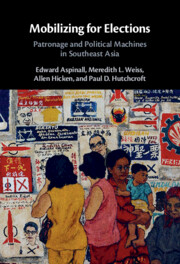Book contents
- Mobilizing for Elections
- Mobilizing for Elections
- Copyright page
- Contents
- Figures
- Tables
- Acknowledgments
- Terms and Acronyms
- 1 Patronage and Political Machines in Southeast Asia
- 2 Historical and Institutional Foundations
- 3 Mobilization Networks and Patterns of Patronage
- 4 Targeting Individuals: Don’t You Forget about Me
- 5 Targeting Groups
- 6 Hijacked Programs
- 7 Patronage and Identity
- 8 Subnational Variation
- 9 Conclusion
- Book part
- Bibliography
- Index
6 - Hijacked Programs
Using Public Policy for Patronage Purposes
Published online by Cambridge University Press: 04 August 2022
- Mobilizing for Elections
- Mobilizing for Elections
- Copyright page
- Contents
- Figures
- Tables
- Acknowledgments
- Terms and Acronyms
- 1 Patronage and Political Machines in Southeast Asia
- 2 Historical and Institutional Foundations
- 3 Mobilization Networks and Patterns of Patronage
- 4 Targeting Individuals: Don’t You Forget about Me
- 5 Targeting Groups
- 6 Hijacked Programs
- 7 Patronage and Identity
- 8 Subnational Variation
- 9 Conclusion
- Book part
- Bibliography
- Index
Summary
Chapter 6 focuses on macro-particularism – the hijacking of programmatic policies. It highlights the difficulty of drawing a clear line between programmatic and patronage politics. It explains three forms of macro-particularism: credit-claiming (when a politician claims their individual intervention was critical to delivering a benefit to an individual or group); facilitation (when the politician actually does intervene to ensure delivery); and morselization (when the politicians breaks a program into bite-sized chunks and allocates them according to political criteria). The chapter explains that the three case-study countries present different mixes of these forms. Hijacking under Malaysia’s party-dominated system lacks incentives to allow morselization and so hijacking mostly involves credit-claiming and facilitation of benefits provided by the dominant party. The deeply entrenched local machines of the Philippines represent a system founded on discretion, hence, more morselization. Indonesia is mixed: some politicians, notably regional executives, enjoy discretion in allocating resources; legislators are still trying to expand access to state resources for hijacking.
Keywords
- Type
- Chapter
- Information
- Mobilizing for ElectionsPatronage and Political Machines in Southeast Asia, pp. 150 - 175Publisher: Cambridge University PressPrint publication year: 2022

